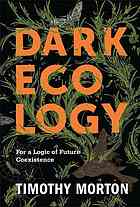
Dark Ecology
For a Logic of Future Coexistence
کتاب های مرتبط
- اطلاعات
- نقد و بررسی
- دیدگاه کاربران
نقد و بررسی

May 16, 2016
Morton (Hyperobjects), a philosopher and professor of English at Rice University, attemptsâwith mixed resultsâto poetically jump-start a searching reevaluation of philosophy, politics, and art in light of the current ecological crisis. The book is strange, and some may find it decidedly uncanny. In and through its looping prose, he argues that there are strata of acclimatizations that must be made in mind, body, and soul for humans to come to "ecognosis": the knowledge that our very conception of nature might be what is destroying it. In a stream-of-consciousness style, Morton weaves together scientific and humanistic perspectives to craft a text that argues that the current ecological crisis is linked to a "logistical âprogram'â" that has been present in human systems since the Stone Age. "Dark ecology" is the recognition that the changes that must be made involve melancholy, irony, unsettling joy, and ultimately radical transformations in the ways humans conceive of, and live in, the universe. Morton commands readers' attention with his free-form style, but some may find it as repellent as it is compelling. Morton extends his previous work to offer a seismically different vision of the future of ecology and humankind.

March 15, 2016
Morton (Rita Shea Guffey Chair in English, Rice Univ.; Hyperobjects: Philosophy and Ecology After the End of the World) doesn't reject the notion that the Earth is in an Anthropocene geologic epoch, when the planet is geologically profoundly impacted by human activity. Yet he focuses on its continuity with the Holocene, or as he calls it, the agrilogistic, epoch--differing from the present only in matters of degree--when, some 12,000 years ago, hunter-gatherers became farmers and settled into the tilling and gouging of the earth. Morton spells out an "ecognosis," or ecological awareness that is not only dark depressing, but dark uncanny, and--working through multiple stages of depression--dark sweet, like chocolate. He advises taking the long view, but in a surprisingly hopeful concluding thread advocates playful subversive politics in the present. VERDICT The journey through this book is philosophically dense, weaving the teachings of Immanuel Kant, Jacques Derrida, Jacques Lacan, and Charles Baudelaire, to name but a few, and best approached by readers with a rich background of the subject. For readers with the chops to take them through the undergrowth, this is a rewarding hike.--Steve Young, McHenry Cty. Coll., Crystal Lake, IL
Copyright 2016 Library Journal, LLC Used with permission.

























دیدگاه کاربران